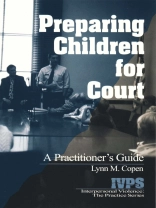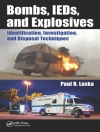‘Going to court can be frightening and confusing for children, particularly for those already harmed by a traumatic event. These excellent pamphlets explain criminal and civil court procedures with child-friendly language and illustrations. They are designed to help children understand the child witness′ role and court processes. The authors are to be commended for taking on this important task.’
–Sarah H. Ramsey, Professor of Law and Director, Syracuse University College of Law
Every year thousands of cases of child abuse involving young witnesses are referred to the court system. Properly preparing children for the experience of court can minimize the emotional stress and allow them to become more credible witnesses. The first of its kind, Preparing Children for Court , is intended as an aid for social workers, court educators, victim/witness specialists, law enforcement, therapists, and attorneys. Written in an engaging manner, this text divulges the ‘tricks of the trade’ that will allow the child to enter the legal systems without negative consequences.
This text is packaged with three children′s workbooks to facilitate the child′s learning and understanding of the court process. Viewed as an essential toolkit, no professional in the field should be without this volume and its accompanying workbooks.
Price includes one set of the three workbooks
İçerik tablosu
PART ONE: EDUCATOR INFORMATION: BUILDING A FOUNDATION
Introduction Information for Court Educators
The Need for a Court Educator
Possible Functions of a Court Educator
Common Problems Encountered and Learning Basic Rules of Court
Suggested Tools and Supplies
PART TWO: PREPARING TO PERFORM DUTIES AND FUNCTIONS
Case Assessment Phase
PART THREE: BASIC FOUNDATION INFORMATION: COMMUNICATING WITH CHILD WITNESSES
Basic Information
Facts about Children′s Language Skills
Potential Sources of Information about a Child′s Communication Abilities or Limitations
Communication Problems with ′Multiple Events′ or ′Repeated Act′ Cases
The Need to ′Anchor′ a Witness during a Conversation
PART FOUR: MEETING THE PARENT AND CHILD
Meeting the Parent and Child
PART FIVE: THE COURT EDUCATOR, LAWYER AND THERAPIST
What to Look for When Screening a Case for Specialized Intervention
Crisis Management versus Therapy
The Role of a Therapist in a Court Case
What Should a Therapist Ask When Contacted by a Lawyer?
Preparation Suggestions
PART SIX: A PROSECUTOR′S PERSPECTIVE ON COURT PREPARATION: BOUNDARIES AND ROLES
The Role of a Prosecutor – Thomas J Fallon
Interdisciplinary Teamwork
Time and Effort
Vertical versus Horizontal Prosecutor
The Charging Decision
Preliminary Hearings and Grand Juries
Preparing the Child for Court
The Prosecutor′s Responsibility
Working with the Severely Traumatized Child
Preparing the Court for the Child
Pretrial Motion Practice
Introducing Evidence of Other Acts of Abuse
The Discovery Process
Videotape and Closed Circuit Television
Contact with the Defense
Negotiations
Meeting with the Defense
Trial Considerations and Testimonial Tips












